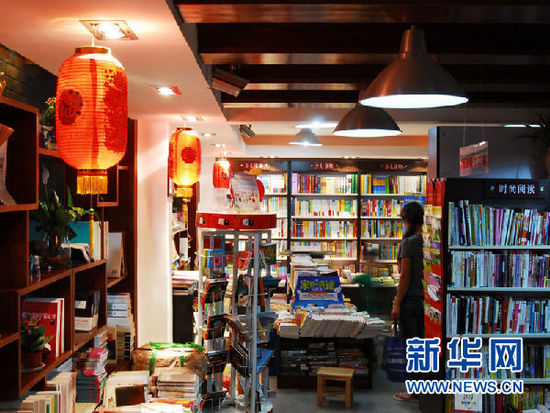


A bookstore in Nanchang, Jiangxi province. (Photo/Xinhua)
After a prolonged slump, brick-and-mortar bookstores in China have ushered in a new round of development, and in 2018 they even showed a rare trend of expansion.
“Today, shopping malls, commercial real estate, public facilities, blocks, communities, scenic spots, and schools are all endeavoring to attract high-quality bookstores,” said Dong Yiwei, vice director of the printing and publishing department of the Publicity Department of the Communist Party of China (CPC) Central Committee, at the China bookstore conference held on Jan. 8 in Beijing.
Dong explained that last year, China’s physical bookstores ushered in a “window period” with new opportunities to help bookstores grow bigger and stronger.
China’s state-owned bookstore chain Xinhua Bookstore, alongside private bookstore chains and internet-based new media companies, are opening a number of new bookstores across the country.
“While we had worried that physical bookstores would fail and disappear, we found that they had been expanding at an amazing pace in 2018,” said Cheng Sanguo, founder of Bookdao.com, a portal website of the publishing industry.
Large bookstore chains and emerging independent bookstores have all joined the trend of opening new branches, with some bookstore chains opening over 100 stores within one year, Cheng noted, predicting that in the coming two years, there would be more than 10 large bookstore chains, each owning hundreds of bookstores.
China’s privately-owned bookstore chains are expanding at an accelerating rate. By October 2018, Sisyphe had opened over 160 bookstores in nearly 60 Chinese cities, with 85 of these bookstores opening in 2018; Yanjiyou has opened 53 self-run bookstores in 13 Chinese cities; while FanDeng Bookstore, a 2-year-old chain, owns over 200 bookstores in 94 cities across China.
Xinhua Bookstore has also accelerated its expansion since 2018. Xinhua Bookstore’s community bookstore brand, Shangshufang, has set up 198 bookstores in total in central China’s Henan Province, while Xiaojudeng, a Xinhua Bookstore brand focused on picture books, now has 150 bookstores in north China’s Hebei Province.
Internet-based new media companies have also joined the craze. Chinese major digital media platforms Yitiao and Read at Ten have both opened offline bookstores.
Since the cost of online customer acquisition has generally increased and user growth has now slowed, bookstores need to seek new access for online business, according to an executive of Read at Ten.
A compound mode of business operation has become the primary trend in China’s bookstore industry.
For example, according to a survey of 62 Chinese bookstores conducted by Bookdao.com, only one only sold books, and only three didn’t serve food or beverages. All surveyed bookstores were selling creative cultural products and stationery alongside books.
Dan Jie, the founder of Yanyouji, disclosed that they had opened two book-themed restaurants which they thought would see a deficit, but instead, they made a profit in less than six months.
86.7 percent of China’s shopping malls have now introduced brick-and-mortar bookstores, noted Lyu Yandan, vice director of Business Brand Institute (BBI) of Communication University of China.
Many shopping malls now regard these bookstores as a means of attracting customers, as the people who often visit bookstores generally enjoy a relatively high income, and are regarded as the target population of these shopping malls. Therefore, bookstores in shopping malls often enjoy a favorable rent, explained Lyu, saying this is one of the reasons that there has been a rise in bookstores opening in malls.
Though brick-and-mortar bookstores are expanding at a rare speed in China, some deep-rooted problems that have troubled these stores still haven’t been solved – namely that the popularity and customer flow haven’t converted into corresponding sales and profits.
While well decorated and creative bookstores have always sprung up in China, sales of books haven’t significantly increased along with the popularity of stores, as instead of buying books, many people only visit the bookstores to take photos and drink coffee.
“Physical bookstores need to figure out how to turn the phenomenon of customers racing to visit the stores into customers rushing in to buy books,” said Cheng.
 Fire brigade in Shanghai holds group wedding
Fire brigade in Shanghai holds group wedding Tourists enjoy ice sculptures in Datan Town, north China
Tourists enjoy ice sculptures in Datan Town, north China Sunset scenery of Dayan Pagoda in Xi'an
Sunset scenery of Dayan Pagoda in Xi'an Tourists have fun at scenic spot in Nanlong Town, NW China
Tourists have fun at scenic spot in Nanlong Town, NW China Harbin attracts tourists by making best use of ice in winter
Harbin attracts tourists by making best use of ice in winter In pics: FIS Alpine Ski Women's World Cup Slalom
In pics: FIS Alpine Ski Women's World Cup Slalom Black-necked cranes rest at reservoir in Lhunzhub County, Lhasa
Black-necked cranes rest at reservoir in Lhunzhub County, Lhasa China's FAST telescope will be available to foreign scientists in April
China's FAST telescope will be available to foreign scientists in April "She power" plays indispensable role in poverty alleviation
"She power" plays indispensable role in poverty alleviation Top 10 world news events of People's Daily in 2020
Top 10 world news events of People's Daily in 2020 Top 10 China news events of People's Daily in 2020
Top 10 China news events of People's Daily in 2020 Top 10 media buzzwords of 2020
Top 10 media buzzwords of 2020 Year-ender:10 major tourism stories of 2020
Year-ender:10 major tourism stories of 2020 No interference in Venezuelan issues
No interference in Venezuelan issues
 Biz prepares for trade spat
Biz prepares for trade spat
 Broadcasting Continent
Broadcasting Continent Australia wins Chinese CEOs as US loses
Australia wins Chinese CEOs as US loses